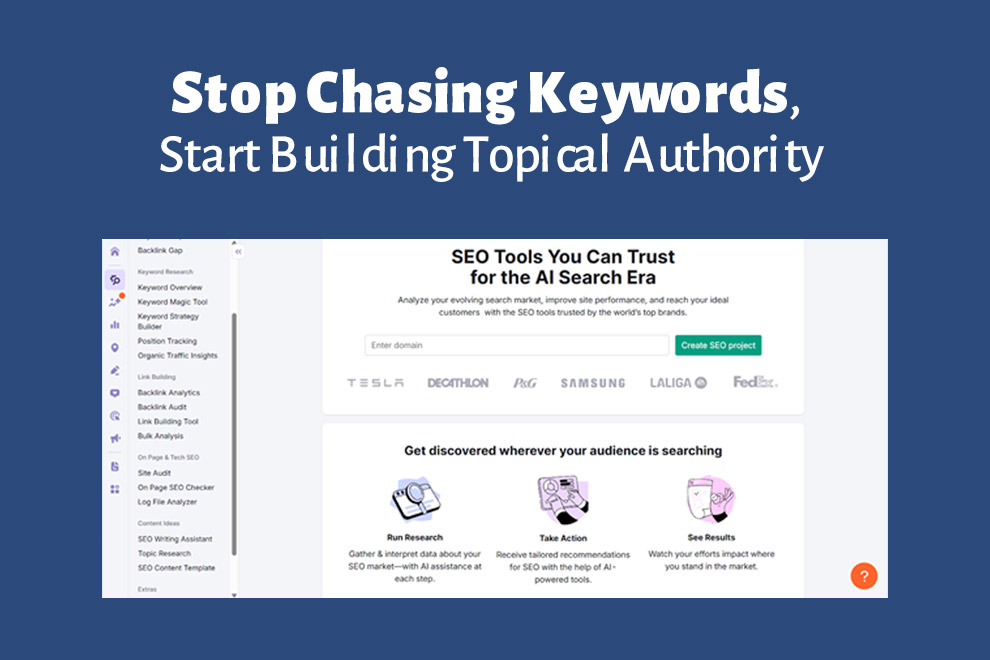**This post is sponsored by Semrush. When you purchase through links in this article, we may earn an affiliate commission from Semrush.** Want to rank higher, faster, and more sustainably?
Start by transforming your keyword lists into interconnected topic ecosystems that establish your domain as the definitive authority in your field. Explore how with Semrush.
Search engines are evolving, and so should your strategy. Gone are the days when optimizing individual pages for isolated keywords was enough to climb the rankings. Modern SEO now rewards comprehensive topical depth, sites that demonstrate subject-wide expertise rather than fragmented keyword coverage.
In today’s landscape, algorithms and AI-driven search tools evaluate not only how well a single page matches a query, but also how effectively an entire domain communicates authority across interconnected topics. That means creating a cohesive content ecosystem that aligns with both user intent and search context.
As SEO thought leader Jeremy Moser summarized, “The key to winning in both classic and AI SEO? Stop chasing random keywords and start owning your domain.”
Why Traditional Keyword Targeting Falls Short
Many SEO practitioners are discovering that keyword-level strategies can backfire when scaled. As content libraries grow, content cannibalization, multiple pages targeting similar terms and intents, becomes inevitable. Instead of boosting rankings, these overlaps create internal competition, confusing search engines and diluting topical authority.
The challenge is magnified when balancing depth versus breadth. Too few subpages can make your content feel superficial, but too many thin pages create weak signals that fail to demonstrate expertise.
Finally, even as “topical authority” becomes a buzzword, measuring it remains difficult. Without a reliable way to track how well your content ecosystem performs across topic clusters, it’s hard to assess whether your strategy is actually building domain-wide strength.
Building an Interconnected Content Ecosystem
This is where the Semrush SEO Toolkit comes in. It provides the advanced workflow SEOs need to build, manage, and measure topical authority effectively:
- Keyword Magic Tool: Find and organize the best keywords for your domain. Identify semantic connections, long-tail variations, and intent-based groupings that can serve as the foundation for content clusters.
- Keyword Strategy Builder: Convert research into structured hierarchies, creating pillar pages supported by subpages that build depth and reinforce authority.
- Site Audit: Identify internal linking opportunities that connect related content, distribute authority signals across your domain, and strengthen your overall ecosystem.
- On Page SEO Checker: Receive semantic optimization recommendations to ensure each piece of content captures a topic comprehensively, not just a single keyword.
- Keyword Overview Tool: Analyze how your domain performs across various topics to monitor progress and uncover new cluster opportunities.
These tools work in harmony to eliminate keyword cannibalization, support context-rich content structures, and help SEOs align strategy with modern search behavior.
Measuring and Scaling Topical Authority
Quantifying topical authority is one of the most complex challenges in SEO. However, by tracking performance across keyword clusters, instead of individual terms, marketers can measure progress more meaningfully.
Semrush allows you to monitor ranking improvements across topic groups, assess visibility growth within a subject area, and evaluate internal linking health. This data-driven approach replaces guesswork with measurable indicators of authority.
As one practitioner on LinkedIn put it: “We all knew the importance of topical depth. But now, it’s about association, between brands and their capabilities. You can’t hack your way to the top anymore through isolated keyword manipulation.”
Why Topical Depth Wins in Modern Search
AI-driven search, vertical search engines, and semantic algorithms all prioritize completeness and credibility. A domain that consistently publishes connected, in-depth content across a field is far more likely to earn trust, and visibility, than one that sporadically targets keywords across multiple subjects.
Search engines reward sites that own the conversation, not those that simply participate in it. The result? Stronger rankings, higher engagement, and greater chances of being cited in AI-powered search outputs.
Traditional keyword targeting builds silos. Topical targeting builds ecosystems, and ecosystems are what modern search engines reward.
How to Start Building Topical Authority
To shift from keyword targeting to topic dominance, follow a strategic framework:
- Identify Core Topics: Use the Keyword Magic Tool to uncover high-value subjects within your domain.
- Cluster Related Keywords: Group terms with shared intent and build pillar pages with supporting subpages.
- Optimize Semantically: Leverage On Page SEO Checker recommendations to ensure full topical coverage.
- Link Intelligently: Use Site Audit insights to connect pages and distribute topical authority signals.
- Track and Refine: Monitor your authority growth through keyword clusters and adjust based on real performance.
This structured approach ensures your domain communicates comprehensive expertise, the signal search engines value most.
From Keyword Lists to Authority Ecosystems
SEO isn’t about gaming algorithms anymore, it’s about proving expertise. Modern SEO tools, especially those from Semrush, empower practitioners to transition from chasing search terms to owning entire topics.
Sites that master this approach don’t just rank higher, they become trusted resources in their industries, gaining long-term visibility and credibility.Ready to build your domain’s authority across every topic that matters? Start mapping your content clusters today with Semrush. Transform keyword research into a roadmap to lasting authority and sustainable search growth.










